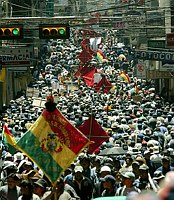Bolivia stalemate rapidly turns into power vacuum
The political crisis in the South American nation has paralyzed institutions
As Bolivia ends its second week of strikes, road blockades, protests and street clashes that have paralyzed country's institutions, the government, the opposition and the separatist movements in the wealthy east fail to find a common solution to defuse the crisis. The stalemate has already lasted for too long, according to analysts, which has rapidly created a power vacuum that different forces are not in position to fill.
President Carlos Mesa is still supported by the military, but has lost any confidence within the population and his former political allies. The same goes for the traditional political parties in the Congress, which have blocked any call on anticipated elections as they are sure they could not get enough votes to keep their posts.
The center-left Movement to Socialism, the only national political force left, looks rather confused by the situation and overwhelmed by the radical attitude of most of its followers. This party, led by farmers' leader Evo Morales, is calling for a constitutional assembly aimed to settle new basis on country's institutions and a new electoral system, in an attempt to put an end to decades of political instability and power concentration in the hands of the 10% European elite.
The Assembly would decide over the demands of autonomy coming from the oil rich wealthy regions of Santa Cruz de la Sierra, Tarija, Pando and Beni, in the east of the country. There, self-proclaimed autonomous groups claim for a self administration of revenues and a new tax system not to keep on “funding the poor west”, as they blame.
There, in the poor west, where the capital La Paz is, farmers, workers (mainly miners) and indigenous groups call for the nationalization of oil and gas reserves (the second largest in South America) despite the pressure coming from foreign companies operating in the country. They also want the immediate resignation of President Mesa the closure of the Congress and, according to one of their radical leaders, Jaime Solares, a nationalistic coup led by a “patriotic army commander.”
But a coup is not only fuelled by radical groups. According to versions in the local press, the head of the Congress and second in Mesa's succession line, Hormando Vaca Diez, has been deliberately delaying the parliamentarian activity to reach an agreement with local business groups, foreign companies and the bellicose separatist in the East, to sack Mesa and become president leading a conservative coalition.
Vaca Diez's adventure looks rather improbable without military support. And even counting with the aid of the boots, his stance would be fiercely resisted by an eventual alliance of radical and moderate leftist forces.
Bolivia is in effect without government, paralyzed and confused. One thing is certain: the stalemate won't last forever.
Subscribe to Pravda.Ru Telegram channel, Facebook, RSS!





